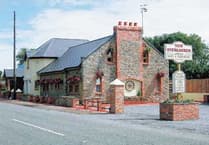The Observer is sad to announce that Pembroke Dock Normandy veteran Ted Owens passed away yesterday (July 18).
He would have been 99 on August 12.
Three times he was seriously injured, but after every fall he returned to the battlefield and valiantly fought on until the end of the Second World War.
Royal Marine Commando George 'Ted' Owens was 19 on June 6, 1944, when he landed on Sword Beach, in France. He was in the first wave of men ashore and within half-an-hour he was involved in an explosion, which colleagues thought had killed him until they turned him over and his eyes moved. He was immediately evacuated and spent two-and-a-half months in hospital with shoulder, back and chest wounds.
Once Ted was discharged, he was involved in the Battle of Walcheren Island, in the Netherlands, where he was injured again in an explosion which ripped through his knee. After he was fit enough to walk, he went straight back into service and joined the Battle of the Bulge, in the Ardennes region, where a piece of shrapnel flew through his neck and windpipe.
"I spent a lot of the war in hospital, but then I'd get back up and get on with it; it is what we had to do," he once told the Observer. "We did all the training, but it wasn't until we actually landed on Sword Beach and I stepped over some bodies that I realised it was for real. I took cover behind a tank and fired five or six rounds at a German position when a shell hit the tank and there was an explosion leaving me paralysed. Everyone thought I was dead and it was only when someone turned me over and saw my eyes move that they realised I was alive."
At the age of 89, Ted went back to Arromanches, the site of his first, and last, landing on the Normandy Beaches with 41 Commando Royal Marines. He started the war working in the fire service in Pembroke Dock before going on to become a Royal Marine Commando.
Seventy years on and he proudly marched with his veteran colleagues through Arromanches, along the same streets that they helped liberate.
“It wasn't bravado that kept us going,” Ted said, “I was absolutely terrified, but we had a job to do and we were determined to get it done.”
The D-Day landings were the largest seaborne invasion ever undertaken and the events of June 6, 1944, signified a turning point in the Second World War in Europe.
In May of this year, Ted joined veterans as they were recognised in Battle of the Atlantic commemoration at Pembroke Dock.
Ted’s last hours were spent with relatives at his bedside at Holyland Lodge Care Home in Pembroke.
Peter Kraus (West Wales Maritime Heritage Society) said of him: “This is such a sad loss to Pembroke Dock. Ted really lived life to the full and the people loved him.
“The stories that he told about his life and what he had seen and done were absolutely amazing and the jokes were brilliant. He will be greatly missed.”




